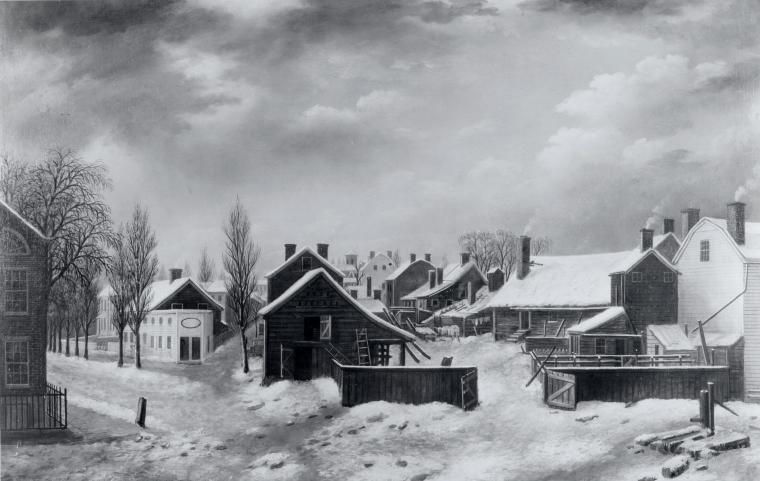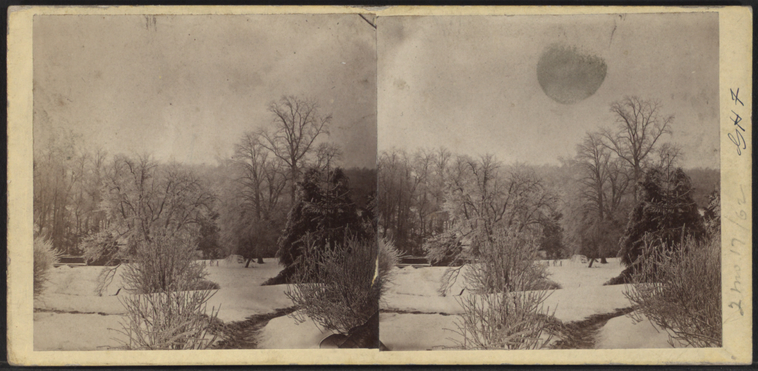In the Bleak Midwinter: 2010 Book List
(Click on winter scenes to enlarge)
In the bleak midwinter, frosty wind made moan,
Earth stood hard as iron, water like a stone;
Snow had fallen, snow on snow, snow on snow,
In the bleak midwinter, long ago.
—Christina Rossetti
As I write this, the temperature is about 60 degrees and winter would seem to be over—although I don’t want to jinx anything by being premature.
But it clearly was a bleak midwinter, not too long ago, and for weeks on end the apt words of the Christina Rossetti poem in its musical setting kept playing in my head. Snow had fallen, snow on snow, and for the most part, either unable or unwilling to go anywhere or do much of anything, I had to fall back on my books for solace. Most seasons are filled with books, but winter seems a particularly good time not only for looking forward to books on the horizon but also for glancing back at books read during the previous year. Looked at in this retrospective vein, most of what I’ve read seems based solely on whim; but even if these books are seemingly unconnected, I have begun to wonder if a long, hard look at them might cause any particular themes or patterns to emerge.
From 1977 on, I have kept a personal book list. Month by month, year by year, I jot down the titles and authors of the books I’ve read. I don’t annotate these entries (which might make it a more useful list) because I know I simply wouldn’t do it. My only rule is that I have to actually finish a book before adding it; the year I abandoned Henry James’s The Ambassadors at the half-way point, I did not record it, much as I was tempted to cheat (half of The Ambassadors should be worth some credit!). I am surprised, when I look back at this list, by how many books I actually do remember, some so vividly I can place myself in the particular circumstances of their reading. Others, however, are totally gone, as if I were pouring water into a cup with a hole at the bottom. What prompted me, in 1982, to pick up The Angel and the Cuckoo by Gerald Kersh, and what was it about? What led me in 1984 to The Tent Peg, by Aritha Van Herk, a book which has been totally scrubbed out of my memory, written by an author I never heard of again? (As a librarian, I could no doubt trace these novels and perhaps reconstruct those memories, but what harm is there in a few gentle mysteries?)

The final book on my 2010 reading list was the new collection of Saul Bellow’s Letters, a gift, which I began to read the day after Christmas. I am not likely to forget those idyllic circumstances. The holiday frenzy was over, and there was a blizzard raging outside, with about a foot of snow piled up on the windowsills and air conditioners; but I had nowhere to go, nothing was expected of me, and I could devote myself for uninterrupted hours to reading. I’ve always been attracted to the published correspondence of favorite authors. They provide a degree of unmediated intimacy that few biographies or even autobiographies can match. This pleasure is colored, however, by the realization that there will probably not be many more such collections. When publishers start touting some modern author’s collected text messages or tweets, you can count me out.
My 2010 list contained a number of biographies and memoirs. Some I have already blogged about, such as the magnificent new biography of John Cheever by Blake Bailey, which should make any beginning author think twice before taking that next drink. Among the best was My Father is a Book, a sensitive memoir of Bernard Malamud by his daughter, Janna Malamud Smith; I suspect that any previous knowledge of Malamud the writer would not be necessary to enjoy this intimate portrait of a time, a place, and a loving father. My vote for most dislikable biography, however, was John Mortimer: The Secret Lives of Rumpole’s Creator, which was remarkable for being so thoroughly mean-spirited, sneering, and hostile. The rancorous author downplayed his subject’s literary achievements, was appalled by his private life, mocked his physical appearance, and even derided his daughter, the actress Emily Mortimer, for taking off her clothes in a film. I also took an occasional step outside my principal area of interest-- which you might have recognized is literature and the people who write it--to read a biography of Jussi Bjorling, the Swedish operatic tenor. If you know opera at all, the name Bjorling will require no explanation; finding an unequivocal best in anything is not easy, but as far as I’m concerned Bjorling was, and remains, unsurpassed. (I can’t resist the urge to include a sample: Jussi Bjorling--Che Gelida Manina)

What place Alice Munro, Penelope Lively, Zoe Heller, Richard Ford, Oscar Hijuelos and others hold on this spectrum of the literary versus the mainstream is a question that can be argued endlessly to no particular purpose. Writers are what they are and must be loved for their peculiar virtues. Alexander McCall Smith and Armistead Maupin strike me as popular novelists in the best and most profound sense. Although Smith is so prolific he seems to write a new novel every month or so, it is his No. 1 Ladies Detective Agency series, set in Botswana, which keeps me coming back, as its central characters are as warm, wise, and engaging as any I’ve encountered. Armistead Maupin’s Tales of the City series, which I’ve followed through its first book publications and subsequent television adaptations, reflects many of the same virtues as Smith’s stories, despite their very different San Francisco locale; it never matters what Maupin’s characters get themselves up to, or how bizarre their adventures, since their every reappearance is like an encounter with dear friends.
![Central Park. [Winter] / published by Edmund Foerster & Co. 15 North William St. N.Y. ; John Bachmann, del. ; J. Bien, lith. ; entered. . .1865., Digital ID 1659267, New York Public Library Central Park. [Winter] / published by Edmund Foerster & Co. 15 North William St. N.Y. ; John Bachmann, del. ; J. Bien, lith. ; entered. . .1865., Digital ID 1659267, New York Public Library](https://images.nypl.org/?id=1659267&t=w)
If you’ve stuck with me this far, you will see how much books and reading matter to me, as I’m sure they do to you. In a universe where pixels seem to be replacing pages, people might tell us we’re clinging to a world that no longer exists or, if it does, is already in tatters and will soon be gone for good. In the meantime, let’s hold onto what we have and continue to read, lose ourselves in, and enthuse about the books which mean something special to us. Although reading is a private pleasure, nothing pleases me more than being able to ignite someone else’s enthusiasm for a particular book or author. Since a large percentage of the books on this list were found on the shelves of the New York Public Library, I’ve provided the links to our circulating copies.
And, since it is already February, I’ve already gotten a healthy start on my 2011 book list.
January Empire Falls, Richard Russo; Death of an Expert Witness, P. D. James; John Mortimer: The Secret Lives of Rumpole’s Creator, Graham Lord
February Time of the Angels, Iris Murdoch; No Name, Wilkie Collins; Too Much Happiness, Alice Munro; Night Train To Lisbon, Pascal Mercier; Family Album, Penelope Lively
March The Price of Butcher’s Meat, Reginald Hill; The God of Nightmares, Paula Fox; A Favourite of the Gods, Sybille Bedford; Noah’s Compass, Ann Tyler; Seize the Day, Saul Bellow; A Compass Error, Sybille Bedford; Henderson the Rain King/ Herzog, Saul Bellow
April Midnight Fugue, Reginald Hill; Cheever: A Life, Blake Bailey; The Believers, Zoe Heller; Rock Springs, Richard Ford; Everything You Know, Zoe Heller; The Great Fire, Shirley Hazzard
May The Double Comfort Safari Club, Alexander McCall Smith; Poor George, Paula Fox; Oh What a Paradise it Seems, John Cheever; Fima, Amos Oz
June The Winged Horse, Pamela Frankau; Notes on a Scandal, Zoe Heller; Friendly Fire, A. B. Yehoshua; About Schmidt, Louis Begley; The Price of Love, Peter Robinson; My Father is A Book, Janna Malamud Smith; A New Life, Bernard Malamud; Schmidt Delivered, Louis Begley
July Shipwreck, Louis Begley; Vacant Posession, Hilary Mantel; The Bottle Factory Outing, Beryl Bainbridge (now only available at the Research library) ; The Moonstone, Wilkie Collins
August The Rebellion of Jane Clarke, Sally Gunning; Clouds of Witness, Dorothy L. Sayers; This Body of Death, Elizabeth George; Beautiful Maria of My Soul, Oscar Hijuelos; The Thin Man, Dashiell Hammett; The Emperor’s Children, Claire Messud
September The Big Sleep/Farewell My Lovely/The High Window, Raymond Chandler; Strangers on a Train, Patricia Highsmith; Bad Boy, Peter Robinson
October Far Cry, John Harvey; Brooklyn, Colm Toibin; The Biter Bit and other Stories, Wilkie Collins (unavailable); Fallen Angels/ Easy Virtue/Hay Fever/The Vortex, Noel Coward; Body Work, Sara Paretsky; American Prince, Tony Curtis
November Matters of Honor, Louis Begley; The Weather in Berlin, Ward Just; All His Sons, Frederick Raphael; Jussi, Anna-Lisa Bjorling; In a Lonely Place, Dorothy Hughes; Mary Ann in Autumn, Armistead Maupin
December Candida/ Caesar and Cleopatra/Pygmalion/Heartbreak House/Major Barbara/Saint Joan/Man and Superman/Mrs. Warren’s Profession/Arms and the Man/Misalliance/The Apple Cart/Getting Married, George Bernard Shaw * ; Letters, Saul Bellow
( * Watch the NYPL Fall class offerings for a presentation on the life and works of George Bernard Shaw)
Read E-Books with SimplyE
 With your library card, it's easier than ever to choose from more than 300,000 e-books on SimplyE, The New York Public Library's free e-reader app. Gain access to digital resources for all ages, including e-books, audiobooks, databases, and more.
With your library card, it's easier than ever to choose from more than 300,000 e-books on SimplyE, The New York Public Library's free e-reader app. Gain access to digital resources for all ages, including e-books, audiobooks, databases, and more.
If you don’t have an NYPL library card, New York State residents can apply for a digital card online or through SimplyE (available on the App Store or Google Play).
Need more help? Read our guide to using SimplyE.


Comments
Welcome back! I have been
Submitted by JF (not verified) on February 18, 2011 - 12:15pm
Life Rafts for the Bleak Midwinter
Submitted by Laura Ruttum (not verified) on March 5, 2011 - 5:55pm
Thanks for your thoughtful
Submitted by Robert Armitage (not verified) on March 8, 2011 - 9:41am